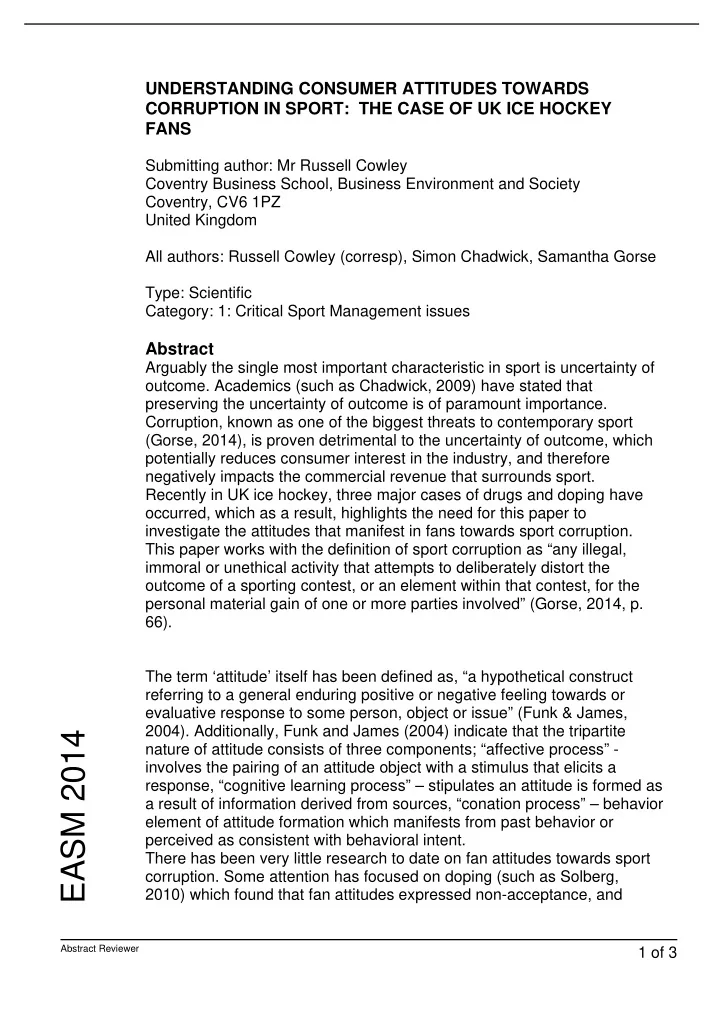

UNDERSTANDING CONSUMER ATTITUDES TOWARDS CORRUPTION IN SPORT: THE CASE OF UK ICE HOCKEY FANS Submitting author: Mr Russell Cowley Coventry Business School, Business Environment and Society Coventry, CV6 1PZ United Kingdom All authors: Russell Cowley (corresp), Simon Chadwick, Samantha Gorse Type: Scientific Category: 1: Critical Sport Management issues Abstract Arguably the single most important characteristic in sport is uncertainty of outcome. Academics (such as Chadwick, 2009) have stated that preserving the uncertainty of outcome is of paramount importance. Corruption, known as one of the biggest threats to contemporary sport (Gorse, 2014), is proven detrimental to the uncertainty of outcome, which potentially reduces consumer interest in the industry, and therefore negatively impacts the commercial revenue that surrounds sport. � Recently in UK ice hockey, three major cases of drugs and doping have occurred, which as a result, highlights the need for this paper to investigate the attitudes that manifest in fans towards sport corruption. This paper works with the definition of sport corruption as “any illegal, immoral or unethical activity that attempts to deliberately distort the outcome of a sporting contest, or an element within that contest, for the personal material gain of one or more parties involved” (Gorse, 2014, p. 66).� � � The term ‘attitude’ itself has been defined as, “a hypothetical construct referring to a general enduring positive or negative feeling towards or evaluative response to some person, object or issue” (Funk & James, 2004). Additionally, Funk and James (2004) indicate that the tripartite EASM 2014 nature of attitude consists of three components; “affective process” - involves the pairing of an attitude object with a stimulus that elicits a response, “cognitive learning process” – stipulates an attitude is formed as a result of information derived from sources, “conation process” – behavior element of attitude formation which manifests from past behavior or perceived as consistent with behavioral intent.� There has been very little research to date on fan attitudes towards sport corruption. Some attention has focused on doping (such as Solberg, 2010) which found that fan attitudes expressed non-acceptance, and Abstract Reviewer 1 of 3
subsequently negatively impacted sponsors decisions to become involved in professional cycling. Further empirical studies (Gau & Brady, 2009) on perception of service quality suggests that motivational attitudes of sport fans may differ depending on their ‘team identification’, and that team identification acts as a moderator to fan behavior. Team identification is defined as “the personal commitment and emotional involvement customers have with a sport [team]” (Gau & Brady, 2009). � � � Given the lack of empirical research on consumer responses to corruption – which may be both cognitive and behavioral in nature - in sport, this research paper adopts an exploratory design to identify consumer attitude using quantitative methods. A 10-minute online survey was conducted and comprised of 2 components using the Likert scale technique; firstly, questions will investigate fan attitude towards sport corruption; secondly, questions will investigate team identification using the PCT (Psychological Connection to Team) scale. The PCT scale measures eight items (identification (4) and internalization (4)) in total, for the purpose of this research, only the 4 items measuring identification will be used in the survey. The survey has been distributed to fans of the top two ice hockey leagues in the UK. The Elite Ice Hockey League (EIHL), consisting of ten teams and the English Premier Ice Hockey League (EPIHL), consisting of ten teams. A minimum of 15 questionnaires per team is expected, making a total population of 300 questionnaires. � � � Results are currently being collected and tabulated, using SPSS, based upon the questionnaire distributed to the fans of each team. It is anticipated that the results will indicate that the response from the fans of teams with recent corrupt cases will differ from those with fans that have not. Moreover, the reaction of fans in response to corrupt behavior, and whether fans are becoming inclined to distance themselves from their sport/team as a result, will be investigated. This evidence should prove crucial to various stakeholders involved in sport and more importantly to those involved in sport business; the commercial stakeholders. Should evidence indicate that fans of various sport markets are declining, inevitably sponsors and those alike will withdraw commercial money as a result. EASM 2014 References Chadwick, S. (2009). From outside lane to inside track: sport management research in the twenty-first century. Management Decision, 47(1), 191–203. � � Funk, D. C., & James, J. D. (2004). The Fan Attitude Network (FAN) Model: Exploring Attitude Formation and Change among Sport Consumers. Sport Management Review, 7(1), 1–26. � Abstract Reviewer 2 of 3
� Gau, L., & Brady, M. (2009). A Model Examining Relationships among Team Identification, Sport Spectators’ Motives, Perceived Service Quality, and Satisfaction. Asian Journal of Management and Humanity Sciences, 4, 76–90.� � Gorse, S. (2014). Corruption in International Sport: Implications for Sponsorship Management, Unpublished Doctoral thesis, Coventry University� � Solberg, H. A. (2010). Doping in elite sport – do the fans care ? Public opinion on the consequences of doping scandals. International Journal of Sport Marketing & Sponsorship, (April), 185–200. EASM 2014 Abstract Reviewer 3 of 3
Recommend
More recommend